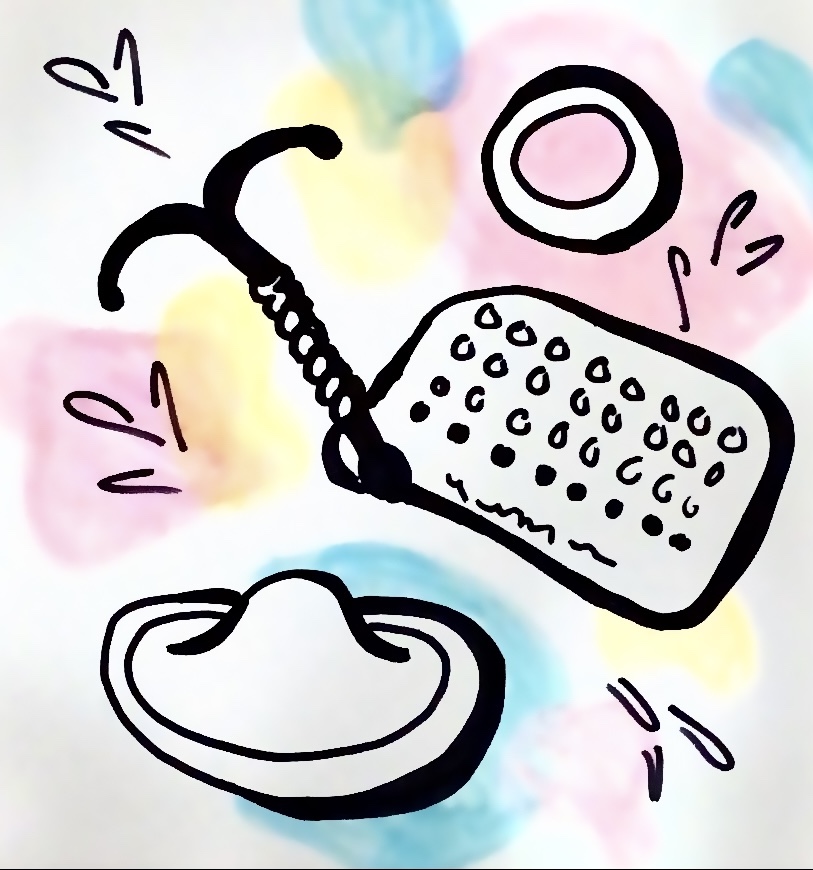Getting comfortable with contraception
Both at ETHS and in Evanston, there are a number of options for students to find contraceptive care.
We’re living in a post-Roe world. Illinois may be—as of yet—unaffected, but looking forward to college decisions, to career paths, to places to settle down, we cannot escape the repercussions of the Supreme Court’s decisions. At ETHS, our school and community at large have made sure we have access to information, reproductive care, and contraception as teens which has become a coveted resource even for adults. And as we move forward into a world where reproductive rights are under pressure, recognizing and utilizing them has become more important than ever.
The hub of reproductive care and information at ETHS is room H101—the Health Center. Nestled into a dark blue hallway between H Hall and the first floor of the North wing, you can find a fully functioning, free of charge, professionally run primary health clinic, with a quiet waiting area and smiling staff — right next to your algebra class.
“Whatever reproductive health services you might be able to get at your pediatrician’s office. You can also get here… We have obtained, for many years now, a grant from the city of Evanston that provides us with funds so that we can purchase contraceptives and provide them free for our student’s dispensaries here, as opposed to sending them to the pharmacy.” Says Ida Joyce-Sia, Health Center Director.
The Health Center has a one-time consent form, which must be signed by parents to use the clinic for any purpose. Once this form is signed, whether it’s for reproductive care, a sports physical, or anything else, students have full access to use the health center’s services. This means that, with nurse approval, students can get prescriptions for short-term hormonal birth control like the birth control pill and other similar methods. However, even without the parental consent form students have access to free condoms and Plan B, an emergency contraceptive that can be taken up to 72 hours after sex.
For minors, there’s often a concern that any conversations you have with an adult about your sex life put your privacy in jeopardy. At school, telling any adult that you’re sexually active, or asking about protection from STDs seems completely counterintuitive. Years of abstinence-only sex education and reprobation of teenage sex have led to students viewing schools much in the way they view their parents in conversations about sex: judgemental and punitive. At the Health Center though, the environment is different—they’re not working for your parents or guardians, they’re there to serve you.
“Sometimes, it’s a harder conversation to have with a parent. We understand that, and we try to support wherever [students] are in their conversation and communication with their parents.” says Health Center nurse Julianne Russell “We do protect student confidentiality. So if a parent were to have concerns, we can’t answer questions regarding a student’s sexual activity or use of contraception with the parent without their student giving us permission.”
But even still, students face social barriers when trying to access contraceptives. With the Health Center being located in school it can feel almost exposing for students to use it. Even though the Health Center provides a variety of forms of medical care, from sports physicals to checkups for minor health issues like sore throats, it still has a reputation as a reproductive care clinic.
“Students think it’s a birth control clinic; they think that if you walk through these doors they’re sort of saying they have chlamydia, or they’re pregnant. I still hear that in the exam rooms where there’s anxiety or discomfort about sitting in that room and us talking about this really sensitive topic,” Joyce-Sia says.
Despite students’ willingness to talk amongst themselves about sex, there’s still a deep-seated discomfort, especially when it comes to female sexuality. Almost every student you talk to can agree that ‘slut shaming’ and gossip about girls’ sex lives are laced with undertones of judgment and disapproval that young men don’t face nearly as much, especially from their peers. Senior Miles Grange has seen this many times throughout the course of his ETHS experience.
“I don’t think any of it really happens to people’s faces, but definitely people gossip about it. And you know they have that thought in the back of their head. People will definitely look down on you in private,” Grange says.
We’ve grown up in a generation that is more sex-positive than any before us. But our parents’ and grandparents’ views are still passed down to us in subtle ways. And as we’ve seen with the overturn of Roe vs. Wade, American culture is still struggling to grapple with modern ideas of what’s morally right, what’s taboo, and what are things we should be comfortable talking about.
“People aren’t used to girls being more sexually sensitive and being in touch with their bodies and what they want to do with them,” says senior Andrea Arce, “I think people are just now realizing that women can do what they want when it comes to their bodies. And they’re getting scared.”
But ETHS is working to minimize the way these stigmas affect its student’s views on contraception. Often sex ed classes are thought of as uncomfortable, riddled with immaturity, and not very topical or relevant to students’ lives. However, at ETHS, although the environment of the class is different for every group of students, the school attempts to foster an environment where asking questions and having important conversations is possible.
“Part of the reason why our school has single-gendered freshman classes is because of these conversations that we have in our freshman year. It’s much, much easier to have them and students tend to feel more comfortable in single-sex spaces,” says freshman P.E teacher Luella Gesky, “Another thing we do is bringing in professionals to make it more comfortable, so it seems less like a specific kid is being targeted and it’s more just general information that you have access to.”
This helps normalize the idea that sex is a part of life. It doesn’t have to be something to joke about or mock– it’s something that your peers do, that adults do, and that you may or may not do, depending on when and if you feel ready. Dispelling that discomfort, and the idea that sex is something that can’t be talked about candidly is the first step to really educating people.
“[Sex ed] was mainly medical. They told us about consent, STDs and pregnancy” says Sophomore Elijah Hamman, “The awkwardness is just knowing that your classmates are there right next to you being taught the same thing. It’s the main teenage stigma around that.”
Many students at ETHS have also had access to reproductive care outside of school. Often, a pediatrician is the person students trust most with information about their reproductive needs. At the very least, students have multiple options and resources to learn about safe sex, and to find out what it might mean for them.
“I’m glad that they don’t do it like in the “old days” where it was ‘don’t have sex or you’ll die’. It’s not like that or anything,” says junior Amelia Anderson, “I think partially schools teach sex ed, but also you’ve probably heard from your doctor ‘if you’re gonna have sex, use protection.’”
We still have a long way to go in our discussion of sexuality. And for many, it can feel like we’re backsliding into a time when reproductive care as a whole was criminalized. But we’re also lucky to be in a time and place where we have the resources and support systems we do.
“My mom also went to ETHS and she told me how the Health Center only got introduced towards the end of her senior year. She told me that a lot of girls were shamed if they had sex, or people found out if they had sex, and that just the concept of schools offering condoms to kids was really foreign. And in comparison to right now, I think that has kind of loosened up,” Arce says.
Your donation will support the student journalists of the Evanstonian. We are planning a big trip to the Journalism Educators Association conference in Nashville in November 2025, and any support will go towards making that trip a reality. Contributions will appear as a charge from SNOSite. Donations are NOT tax-deductible.










